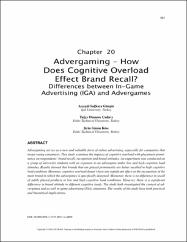Advergaming - How does cognitive overload effect brand recall? Differences between in-game advertising (IGA) and advergames
Künye
Güngör, A. Ş., Çadirci, T. O. & Köse, Ş. G. (2016). Advergaming - how does cognitive overload effect brand recall? differences between in-game advertising (IGA) and advergames. () doi:10.4018/978-1-5225-0435-1.ch020Özet
Advergaming serves as a new and valuable form of online advertising, especially for companies that target young consumers. This study examines the impacts of cognitive overload with placement prominence on respondents' brand recall, recognition and brand attitudes. An experiment was conducted on a group of university students with an exposure to an advergame under low and high cognitive load stimulus. Results showed that brands that are placed prominently are better recalled in high cognitive load condition. However, cognitive overload doesn't have any significant effect on the recognition of the main brand in which the advergames is specifically designed. Moreover, there is no difference in recall of subtly placed products in low and high cognitive load conditions. However, there is a significant difference in brand attitude in different cognitive loads. The study both investigated the context of advergames and as well in-game advertising (IGA) situations. The results of the study have both practical and theoretical implications.


















